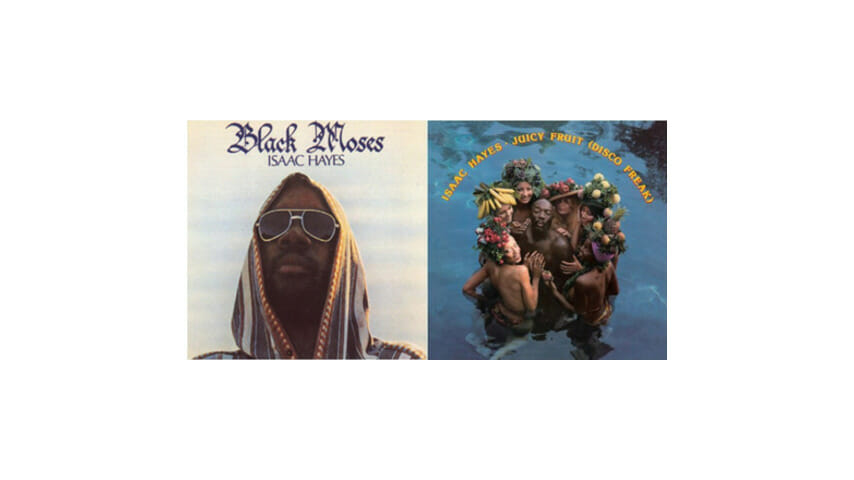
Black Moses: 88
Juicy Fruit: 67
One classic and one cult kook
Before South Park and Scientology, the late, great Isaac Hayes was one of the most celebrated but perhaps still oddly underappreciated prime movers in the development of modern R&B. While the most casual listeners may associate him most closely with the theme from Shaft, and while he arrived with Hot Buttered Soul, it was the double album Black Moses that captured him at his most expansive. Offering a lavishly packaged double album instead of a haphazard collection of singles, and audaciously rerecording songs still fresh on the charts when the album was released, Hayes swung for the fences with Black Moses and largely succeeded. Then Jet editor Chester Higgins’ original liner notes capture the tone of Hayes’ ambition—part tongue-in-cheek self-aggrandizing autobiography, part racial commentary, part very real monument to the power of his amazing voice.
On one level, musically Black Moses demonstrates that Hayes was partially guilty for soul music’s transition from the syncopated, instrumentally rich tones of Motown and Stax’s 60s classics to the slushy slow jams and melisma-addled overkill of the last few decades. The ballads here are choked with strings and flutes that would be Muzak but for the velvet magic of Hayes’ vocal performance. Never maudlin, Hayes’ voice carries real emotional weight, imbued with touches of reflective sadness and humility. Playing it straight on even the cheeky Bachrach/David composition “I’ll Never Fall in Love Again,” Hayes establishes his point of view beyond mere interpretation. Still, the real fun is on uptempo numbers like horny but spry Hayes original “Good Love.” Collectively, Black Moses shows Hayes from several angles, almost all of which are flattering.
It’s no surprise that much of Hayes’ subsequent work never matched the gravitas of Black Moses. The dated but often fun Juicy Fruit/Disco Freak suggests that, in some cases, he wasn’t even trying to reach those heights. The album liner’s photo of dropped panties captures the basic, um, thrust of the album, and songs titles like “Music to Make Love By” serve as a second hint to those who missed the other not-so-subtle clues. Beginning with three minutes of party noise, and Hayes and a few other male voices straining to out-harass an equally overzealous female, the title track ultimately connects with a disco hook but can’t shake the camp. Later in the album, Hayes shifts back to ballads, throwing down a heavily narrative and strangely compelling love song to a hooker on “Lady of the Night.” Reissued on CD for the first time ever, and probably not by accident, this weaker work serves as both an entertaining curiosity and a testament to Black Moses’ strength.